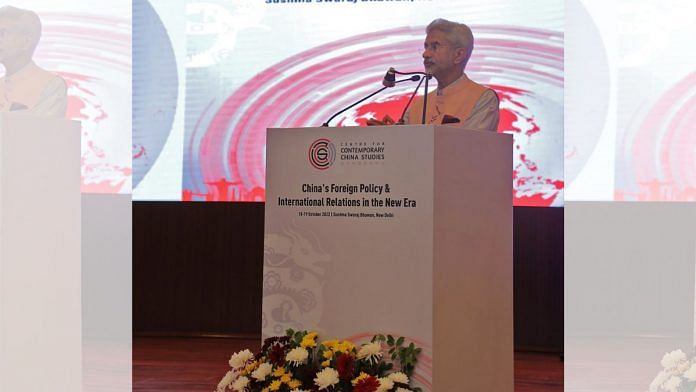New Delhi: External Affairs Minister S. Jaishankar Tuesday said that it is not an easy task to establish “modus vivendi” with China after the 2020 border clash and New Delhi should prepare to compete with Beijing “more effectively” in the immediate periphery.
Addressing a conference on ‘China’s Foreign Policy and International Relations in the New Era’ by Centre for Contemporary China Studies (CCCS), Jaishankar also said, while peace and tranquility in the border areas has been the basis for having normalcy in bilateral ties, this has been ‘mischievously conflated’ by Beijing with the resolution of the boundary question.
“Establishing a modus vivendi between India and China after 2020 is not easy. Yet, it is a task that cannot be set aside. And this can only become sustainable on the basis of three mutuals — mutual respect, mutual sensitivity and mutual interest,” Jaishankar said.
The minister added, “The last few years have been a period of serious challenge, both for the relationship and for the prospects of the continent. The continuation of the current impasse will not benefit either India or China. New normals of posture will inevitably lead to new normals of responses.”
He also said, “It is the willingness to take a long-term view of their ties that the two countries must display today.”
These remarks come at a time when the Chinese President Xi Jinping is poised to get re-elected for an unprecedented third time that will effectively make him the President of China for his entire life. The final decision will be known after the conclusion of the weeklong 20th Communist Party Congress, which began Sunday.
In a public address to the Party Congress Sunday, Xi said, “We will become more adept at deploying our military forces on a regular basis and in diversified ways, and our military will remain both steadfast and flexible as it carries out its operations. This will enable us to shape our security posture, deter and manage crises and conflicts, and win local wars.”
India and China have been engaged in a bitter military standoff in eastern Ladakh since May 2020. Both troops have had disengagement in phases from some of the friction areas but there is no sign of de-escalation yet.
Also read: Hope for stronger counter-terrorism measures under Indian leadership, says SCO’s Chinese chief
Border peace and tranquility ‘mischievously conflated’
While highlighting the fact that maintaining peace and tranquility in the border areas is a prerequisite to having normalcy in bilateral ties, Jaishankar made it clear that it is not the same as resolving the boundary question.
“India’s search for a more balanced and stable relationship with China takes it across multiple domains and many options. Given the developments of 2020, they obviously focus on an effective defence of the border. This was notably undertaken even in the midst of Covid,” he said.
He underscored, “Peace and tranquility in the border areas clearly remains the basis for normal relations. From time to time, this has been mischievously conflated with the sorting out of the boundary question.”
“The truth is that the prerequisite has been and remains one much more modest (sic); and even that was breached in 2020. Economically, further progress in expanding manufacturing and promoting Atmanirbhar Bharat are key,” said Jaishankar.
According to the minister, India has shown “remarkable degree of self-restraint” in the past while dealing with China. But that era, he said, is now a thing of the past.
“Looking back at seven decades of engagement, it would be fair to state that India has essentially taken a determinedly bilateral approach to China. There are many reasons for this, including a sense of Asian solidarity and a suspicion of third-party interests that emanated from other experiences,” said Jaishankar. “Indeed, Indian policy in the past has exhibited a remarkable degree of self-restraint that led to the expectation that others can have a veto over its choices. That period, however, is now behind us. The ‘new era’ is apparently not just for China.”
“Internationally, building deeper relationships and promoting better understanding of its interests strengthens India. We must prepare to compete more effectively, especially in our immediate periphery,” he added.
(Edited by Zinnia Ray Chaudhuri)
Also read: A ‘normal’ LAC won’t end troubles for India. Shift focus to China’s dominance in Asia



